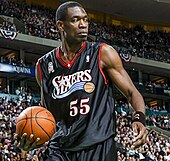J. Walter Kennedy Citizenship Award
| National Basketball Association awards and honors |
|---|
| Team awards |
| Individual awards |
| Honors |
| Sport | Basketball |
|---|---|
| League | National Basketball Association |
| Awarded for | Player, coach or staff member who shows outstanding service and dedication to the community |
| History | |
| First award | 1975–76 |
| Most recent | C.J. McCollum New Orleans Pelicans |
The J. Walter Kennedy Citizenship Award is an annual National Basketball Association (NBA) award given to a player, coach, or staff member who showed "outstanding service and dedication to the community."[1]
The winner was selected by the Pro Basketball Writers Association (PBWA), which represents writers for newspapers, magazines and internet services who cover the NBA on a regular basis. Members of the PBWA nominate players for the award, and then a vote was taken by approximately 150 PBWA members. The person with the highest point total wins the award.[2] The award was named in honor of James Walter Kennedy, the second commissioner (then president)[a] of the NBA.[2]
The award was usually given to a person who made a substantial charitable contribution. For example, Kevin Garnett received the award for the 2005–06 season after donating $1.2 million toward the Hurricane Katrina's relief efforts.[4]
Since its inception, the award has been given to 34 different people. Only one season had joint winners—Michael Cooper and Rory Sparrow in the 1985–86 season. Vlade Divac of Yugoslavia (now Serbia), Dikembe Mutombo of the Democratic Republic of the Congo, Pau Gasol of Spain, Canadians Steve Nash (born in South Africa), Samuel Dalembert (born in Haiti), and Luol Deng of the United Kingdom (born in South Sudan) are the only winners who were not born in the United States. J. J. Barea, the 2018 winner, was born in Puerto Rico, a territory whose native-born residents are U.S. citizens by birth. Mutombo is also the only player to win the award twice.[5] Frank Layden and Joe O'Toole were the only non-players to win the award. Layden, the 1983–84 award recipient, was the head coach for the Utah Jazz,[6] while O'Toole, the 1994–95 award recipient, was the athletic trainer for the Atlanta Hawks.[7]
Winners




| ^ | Denotes player who is still active in the NBA |
| * | Elected to the Naismith Memorial Basketball Hall of Fame |
| Player (#) | Denotes the number of times the player has received the award |
| Team (#) | Denotes the number of times a player from this team has won |
Teams
See also
Notes
References
- General
- "Chauncey Billups Wins J. Walter Kennedy Citizenship Award". NBA.com. Turner Sports Interactive, Inc. May 5, 2008. Archived from the original on September 26, 2013. Retrieved July 21, 2008.
- "J. Walter Kennedy Citizenship Award". NBA.com. Turner Sports Interactive, Inc. Archived from the original on November 19, 2010. Retrieved July 24, 2008.
- Specific
- ^ "Pistons G Chauncey Billups wins sportsmanship award". ESPN.com. Archived from the original on December 22, 2015. Retrieved July 2, 2008.
- ^ a b "Snow Named Winner of J. Walter Kennedy Citizenship Award". NBA.com. Turner Sports Interactive, Inc. June 26, 2007. Archived from the original on October 16, 2014. Retrieved July 21, 2008.
- ^ Mike Monroe. "The Commissioners". NBA.com. Turner Sports Interactive, Inc. Archived from the original on April 7, 2016. Retrieved July 8, 2008.
- ^ "Garnett wins Kennedy Citizenship Award". USA Today. Associated Press. October 31, 2006. Archived from the original on October 22, 2012. Retrieved July 24, 2008.
- ^ "Mutombo wins J. Walter Kennedy Citizenship Award". NBA.com. Turner Sports Interactive, Inc. April 23, 2009. Archived from the original on April 26, 2009. Retrieved April 23, 2009.
- ^ "Frank Layden Coaching Record". basketball-reference.com. Archived from the original on July 24, 2008. Retrieved July 24, 2008.
- ^ "Smith receives NBA's award for community service". The Atlanta Journal-Constitution. April 29, 1998. Archived from the original on April 30, 2021. Retrieved July 22, 2008.
- ^ "Artest's Name Change to Metta World Peace Approved". The New York Times. September 16, 2011. Archived from the original on December 17, 2014. Retrieved September 16, 2011.
